| Srl | Item |
| 1 |
ID:
137717
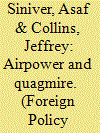

|
|
|
|
|
| Summary/Abstract |
This paper assesses the role that analogical reasoning played in Israel's decision making during the 2006 Second Lebanon War with Hezbollah. Two analogies seemed to dominate internal deliberations: the “air power superiority” analogy which drew on more than a decade of developments in military theory and the air-based campaigns of the two Gulf wars and the Balkan wars of the mid-1990s and late 1990s; and the “Lebanese quagmire” analogy which drew on Israel's own traumatic experience of Israel following the its first war in Lebanon in 1982. The misuse of these analogies by the Israeli political–military leadership during the war produced a myopic approach which advocated an almost total reliance on air power rather than ground maneuver to win the war and refrained from using ground forces for fear of entering another bloody and unpopular war in Lebanon. The constraining power of these analogies prevented the consideration of alternative courses of action or the effective calculation of cost-benefit analysis during the war. Whereas previous studies of the war provided various explanations to singular decisions or episodes, this paper shows that the air power and quagmire analogies contained the conceptual boundaries of Israeli decision making during the war and thus best explain its attraction and limitations.
|
|
|
|
|
|
|
|
|
|
|
|
|
|
|
|
| 2 |
ID:
145097
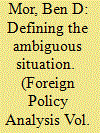

|
|
|
|
|
| Summary/Abstract |
In studies of war and terrorism, an exclusive focus on action misses an important and logically prior stage of constitutive thinking and discursive contestation. Particularly in ambiguous contexts, which states often face when waging conflict against nonstate actors such as terrorist organizations, how the situation is defined is a key to understanding state decision making and action. This paper employs symbolic interactionist theory to analyze the process of defining situations under ambiguity. It argues that how different domestic actors develop preferences for definitions depends on (i) the kind of situational parameters that they monitor as part of their group perspective, (ii) the availability of historical analogies, and (iii) (role)-identity and self-esteem needs, namely the legitimation of actors' claimed identity through an effective role performance. These ideas are examined in a case study of Israeli understanding of and response to Hizbollah's attack of July 12, 2006, which developed into the 2006 Lebanon War (known in Israel as the Second Lebanon War).
|
|
|
|
|
|
|
|
|
|
|
|
|
|
|
|
| 3 |
ID:
153641
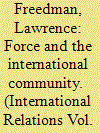

|
|
|
|
|
| Summary/Abstract |
Tony Blair’s April 1999 Chicago speech is widely seen as foreshadowing his later decision to support the invasion of Iraq. Two sets of context for the speech are described: other criteria for the use of force, going back to the Just War tradition and more recent contributions from Caspar Weinberger and Colin Powell, and the December 1998 strikes against Iraq and the Kosovo War, which began in March 1999. The origins of the five factors mentioned when considering force are explored and their implications assessed.
|
|
|
|
|
|
|
|
|
|
|
|
|
|
|
|
| 4 |
ID:
076060
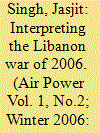

|
|
|
| 5 |
ID:
190986
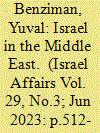

|
|
|
|
|
| Summary/Abstract |
During its 75 years of existence, Israel’s strategies vis-à-vis its neighbours have alternated drastically in accordance with the vicissitudes in regional and global affairs: from reliance on force, to a status quo approach, to combining ‘land-for-peace’ approach while participating in ‘new wars’, to peace initiation, to unilateral action, to improved relations with the Arab world while trying to avoid the Palestinian issue. This article describes the evolution of these strategies, discusses their origin and underlying assumptions, and assesses their future implications.
|
|
|
|
|
|
|
|
|
|
|
|
|
|
|
|
| 6 |
ID:
131873
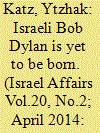

|
|
|
|
|
| Publication |
2014.
|
| Summary/Abstract |
This article examines the protest movement of the younger generation of Israeli songwriters and performers that emerged in response to the vicissitudes of the Arab-Israeli conflict over the past decades, notably the 1982 Lebanon war, the outbreak of the Palestinian intifada (December 1987), and Israel's unilateral disengagement from Gaza (2005). It argues that while this movement succeeded in inserting itself into the cultural and public arenas and shaking some of the unwavering beliefs and convictions held by the 'founding generation', its overall impact has remained limited.
|
|
|
|
|
|
|
|
|
|
|
|
|
|
|
|
| 7 |
ID:
091337
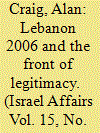

|
|
|
|
|
| Publication |
2009.
|
| Summary/Abstract |
Israel's massive military response was a clear departure from the law enforcement duties of an occupying power. Lawyers were now needed to provide legal protection for a military engaged in armed conflict with terrorists under occupation. This was neither war nor a policing operation and, according to Reisner, the IDL saw it as 'something in between', hence the novel formulation of an 'armed conflict short of war'. Nevertheless, offering legal advice on the proper legal construction of the conflict is very different from involvement in operational decision making.
|
|
|
|
|
|
|
|
|
|
|
|
|
|
|
|
| 8 |
ID:
137593
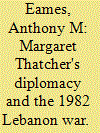

|
|
|
|
|
| Summary/Abstract |
The year 1982 emerged as pivotal in the Atlantic Alliance and the relationship between President Ronald Reagan and Prime Minister Margaret Thatcher. On 6 June 1982, Israeli Defense Forces breached the Lebanese border in a maneuvre to eradicate the Palestinian Liberation Organization. The campaign opened a violent episode in the decades-old Arab-Israeli conflict. Almost immediately the British Foreign and Commonwealth Office recognized the challenge to the international community. The crisis in the Middle East occurred during a period of substantial turnover in the foreign policy communities of both London and Washington. Subsequent improved bilateral relations between the United States and the United Kingdom paved the way for greater cooperation in international diplomacy between respective national executives.
|
|
|
|
|
|
|
|
|
|
|
|
|
|
|
|
| 9 |
ID:
131854
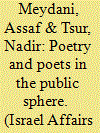

|
|
|
|
|
| Publication |
2014.
|
| Summary/Abstract |
Political poetry is not tested by its impact and the number of its readers but in its very participation in the public discourse on the issues of the day. Poetry moves between forces that focus the attention of its audience inwards, to the lyrics of the poems, and the forces that connect to the social, cultural, and political climate in which the poems are published. These movements reflect the power of poetry, which, using language, breaks the barriers that exist between people - individuals or groups, as well as between these individuals or groups and reality. This way, the poet serves as the element that formulates the informal cultural feelings in society and offers an interpretive package of the existing reality, as well as the alternative reality. Poets place their 'truth' within the perception of reality, and this truth can compete in the public arena with the 'truth' that is portrayed by politicians.
|
|
|
|
|
|
|
|
|
|
|
|
|
|
|
|
| 10 |
ID:
089010
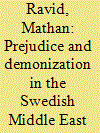

|
|
|
| 11 |
ID:
085120
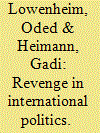

|
|
|
|
|
| Publication |
2008.
|
| Summary/Abstract |
This paper conceptualizes the phenomenon of revenge in international politics and seeks to specify the conditions that increase or diminish the tendency of states to take revenge against enemies. We situate the discussion of revenge within the broader context of emotions in IR. We argue that whether or not a state will take revenge depends on the combinations of three interrelated and mutually constitutive variables: (1) the degree to which a state emotionally experiences harm against it as morally outrageous, (2) the extent of humiliation the harmed state feels, and (3) the degree to which international retaliation is institutionalized by rules and laws that govern the use of cross-border force. We examine the Second Lebanon War (July 2006) as a case of revenge in international politics.
|
|
|
|
|
|
|
|
|
|
|
|
|
|
|
|
| 12 |
ID:
096452
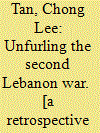

|
|
|
|
|
| Publication |
Israel, Israel National Defense College, IDF, 2008.
|
| Description |
77p.pbk
|
|
|
|
|
|
|
|
|
|
|
|
Copies: C:1/I:0,R:0,Q:0
Circulation
| Accession# | Call# | Current Location | Status | Policy | Location |
| 054961 | 956.920436/TAN 054961 | Main | On Shelf | General | |
|
|
|
|
| 13 |
ID:
108523
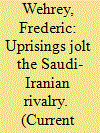

|
|
|